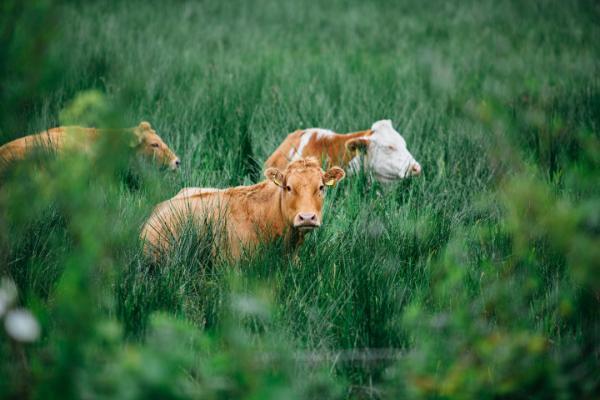Tuesday, 21 January, 2025
Researcher: Professor Carl Ng, UCD School of Biology and Environmental Science
Summary
Professor Ng’s research focuses on addressing the major societal challenge of reducing chemical fertiliser use in order to improve sustainability in agriculture. The team’s research showed that it is possible to reduce chemical fertiliser application by 25% in Irish pasture systems with no significant loss in agricultural production and no compromise on grass quality, when supplemented with an Irish-produced algal biostimulant from the brown seaweed, Ascophyllum nodosum. This has the associated benefit of reducing greenhouse gas emissions. The research demonstrated a path forward for agricultural sustainability and reducing the negative environmental impacts of fertiliser application. The research also directly contributes to achieving the ambitious targets set out in the (opens in a new window)Irish National Climate Action Plan, the (opens in a new window)EU Farm to Fork Strategy, (opens in a new window)the EU Green Deal, and the (opens in a new window)United Nations Sustainable Development Goals.
Research description
This research has shown that an algal biostimulant can reduce the use of nitrogen fertiliser on pasture systems by 25% without a loss in quality or yield. The research has also demonstrated the environmental benefits associated with this reduced use of fertiliser. To achieve this, the research focused on two interconnected questions:
- Can chemical fertiliser application in pasture systems be reduced by 25% through the application of a biostimulant, without affecting agricultural production or quality?
- What are the environmental benefits of such a reduction of chemical fertiliser application?
The team worked with farmers to conduct field trials on farms over two years, where they assessed the impact of this biostimulant on a range of farm systems (such as pasture grazing vs. silage harvesting) and soil types.
As a result of these trials, the team found that there was no loss in agricultural outputs due to the reduced nitrogen application and use of the biostimulant instead.
The team also designed and constructed lysimeters, devices for measuring the percolation of water through soils and for determining the soluble constituents removed in drainage. This allowed the team to collect leachate, which is the liquid that has passed through the soil, in order to determine the amount of nitrate that leaches into groundwater, thus allowing for the assessment of the impact on water quality over the growing season. The team also measured soil emissions in the form of the greenhouse gas nitrous oxide, which has a higher global warming potential than carbon dioxide. The research showed that use of the algal biostimulant resulted in reductions in leachate and nitrous oxide emissions due to the reduced fertiliser, with no compromise on yield and quality.

Research impact
Environmental and health impact
Agriculture is Ireland's most important indigenous industry with exports of around €20 billion annually. The country’s largest exports of milk and beef are underpinned by the fact that 90% of all agricultural area in the country is devoted to grass. The agricultural sector is particularly important in regional areas, employing 165,000 people directly in the agri-food sector. However, this agricultural economy is under pressure due to the legal obligation of each sector of the Irish economy to reduce emissions.
Under the Irish Climate Action Plan, Ireland is committed to reducing greenhouse gas emissions by 51% by 2030. Agriculture is the biggest emitting sector in Ireland (38% of emissions) and is legally bound to a 25% reduction within this timeframe. Nitrous oxide is a potent greenhouse gas that is primarily associated with agriculture, in particular with the application of chemical fertilisers, and in Ireland accounts for 25% of emissions. For this reason, there are a number of initiatives targeted at reducing chemical fertiliser usage, and Professor Ng’s research will significantly contribute to reducing the use of chemical fertiliser and ensuring that agricultural practices are more sustainable for the future.
In addition, the intensification in agricultural production, enabled in large part by the application of chemical fertilisers to soils, has resulted in reduced water quality. This puts the retention of Ireland’s nitrates derogation from Europe, which allows farmers to farm at higher stocking rates, in significant doubt. Loss of this derogation would be potentially ruinous to the sector, requiring a reduction of up to 15% in the national herd, the potential loss of Ireland’s family farm model, where the farm is passed on from one generation to the next, and negative impacts on the towns, villages, and rural communities that are supported by the farming industry. For this reason, Professor Ng’s research on chemical fertiliser reduction will not only have significant impact on agricultural practices in Ireland, but also on rural communities.
Technological impact
The technological impact of the research lies in:
- the development and successful implementation of a novel method of application of the algal biostimulant. The algal biostimulant is coated onto the fertiliser.
- the application of the algal biostimulant-coated chemical fertiliser to coincide with conventional agricultural practice.
The research has shown significant environmental benefits including less greenhouse gas emissions (primarily nitrous oxide) and improved water quality.
The primary impact of the research has been the development of the Terra range of fertilisers, produced by Target Fertilisers in a partnership with Brandon Bioscience. This range of fertilisers includes a range of straight (C.A.N. – calcium ammonia nitrate) and compounded (e.g. cut sward – NPK at 24;2.5;5 %) fertiliser products that are coated with the algal biostimulant. The research has shown that application of these products can reduce chemical fertiliser use by up to 25 % and thus contribute to more sustainable agriculture by reducing the level of nitrous oxide produced, and also by improving water quality through less nitrate in the leachate.
These commercial products are available all over Ireland and their use by farmers is another option to reduce chemical fertiliser usage. Reduction in chemical fertiliser usage is one of the main reasons for the 5% reduction in agriculture emissions in 2023. The use of the algal biostimulant can continue to contribute to the reduced use of chemical fertiliser without losses in agricultural production. It also contributes to positive outcomes on Ireland’s national greenhouse gas inventory and to meeting key targets in the EU Farm to Fork strategy and European Green Deal.
Academic impact
In addition to producing two original, internationally peer-reviewed open access research papers, this research has been described and disseminated through a range of media, primarily aimed at promoting the algal biostimulant-coated fertiliser to the farmers as the end users. This includes publication in popular agricultural blogs such as (opens in a new window)Agriland, traditional newspapers for farmers such as the (opens in a new window)Irish Farmer’s Journal, and promoted on the industrial partners’ websites, such as (opens in a new window)J Grennan & Sons and (opens in a new window)Target Fertilisers.
The research has also been recognised with an Innovation award from Enterprise Ireland (Enterprise Ireland Innovation Arena Award – shared by the project’s industrial partners Brandon Bioscience and Target Fertilisers), which recognises advancements and innovation in the production of inorganic fertilisers.


